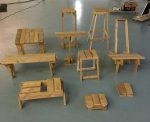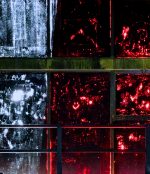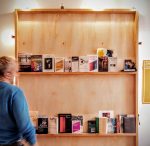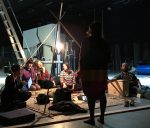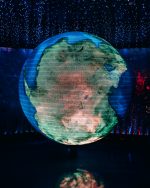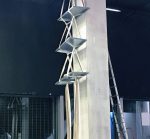MON 7th
14:00 meeting
17:00 cleaning, emptying the collective space
19:00 dinner
TUE 8th
10:00 Materials and Tools
WED 9th
10:30 Scheduling
11:00 Katinka van Grokum, a.pass opening week presentation: SketchUp as an Interior
12:00 Caterina Mora: Translating Ballet to Regaton
13:00 Living Together: organising cooking cleaning up
14:00 Research and Space (conversation with new a.pass researchers and LM and VM)
16:00 Ezster Nemethi TBC
THU 10th
9:00 Caterina Mora: Training, Translation (Ballet and/or/vs Regaton)
10:30 Scheduling
11:00 Deborah Birch, a.pass opening week presentation: Caves II. Re-entry
14:00 Katinka van Grokum: Trash Talk, recycling in Belgium
16:00 Chloe Chignell, a.pass opening week presentation: Choreographic Strategies for Writing
17:00 Christina Stadlbauer, a.pass opening week presentation: Sharpening the Narrative
FRI 11th
12:00 Signe Frederiksen, a.pass opening week presentation
Cooking: Amelie van Elmst
15:30 Maurice Meewisse, a.pass opening week presentation
17:00 Meri Ekola, Light Observations
18:00 Caterina Mora: Training, Translation (Ballet and/or/vs Regaton) with a guest dancer
SAT 12th
SUN 13th
MON 14th
9:00 Caterina Mora: Training, Translation (Ballet and/or/vs Regaton)
11:30 Diego Echegoyen, a.pass opening week presentation
12:30 Goda Palekaitė, a.pass opening week presentation: Legal Implications of a Dream
"Legal Implications of a Dream" is the title of Goda's research and her solo exhibition which just opened in Tel Aviv and Jerusalem. Let us think of settlement as an occupied space which materializes as a consequence of a collective dream.
14:00 Scaffolding Introduction (how to and safety instructions)
16:00 Human Condition Reading Club part I
TUE 15th
10:00 Scheduling
10:30 Outside Walk (Mathilde Maillard) 1h
12:00 Alex Arteaga, Input: Architecture of Embodiment and destabilizing an architectural object
Disclosing an Architectural Object is an artistic research framework that allows an approach to a twofold object of inquiry: the architectural organization of material and the cognitive agency of aesthetic media, practices and artifacts.
14:00 Meeting with Michele Meesen and Joke Liberge: organisational, budget, etc for first block researchers (end 16:00)
16:00 Laura Pante, apass opening week presentation: On Metaphorology
18:00 Caterina Mora: Training, Translation (Ballet and/or/vs Regaton)
WED 16th
10:00 Mathilde Maillard: a.pass opening week presentation: Work Club / Club Travail
11:00 Peggy Pierrot, Do You Belong ?
Artistic activities are shaped by continuous trips, international workshops and residencies abroad. In this context, each work session operates like a colonization of some people space, means and life by the artistic presence and vision. The artist settles in different environments, whether his work aim to relate directly or not at all to the different creation contexts. In this international scene of seesaw motion, how can one’s cultivate his sense of belonging, of beeing from, of being rooted, without a nationalist content, but without being a post modern nomad of emptiness? How do YOU, settler, react to this constraints (langage, food, bodies, papers...). What do you take or leave ? What do you gain from this artistic nomadism ? Do you belong somewhere ? We’ll question these assumptions through an insight on the work of the artist Pierre Creton.
14:00 Flavio Rodrigo, a.pass opening week presentation: Sensations, Paths and Rituals of Work with the Creative Imagination (establishing the initial relations of my research). Please bring you mobile phone and headphones, you will need them during the presentation.
18:00 Caterina Mora: Training, Translation (Ballet and/or/vs Regaton)
THU 17th
9:00 Caterina Mora: Training, Translation (Ballet and/or/vs Regaton)
11:00 Elen Braga: The World to Come
If we have a history-line, what are the most important events of the last 30 years of human life that come to our mind? Is there a connection between those events and the context of our artistic research? What are the symptoms of those events and how to prophesize the world to come? We will start the exercise using the allegory of Nebuchadnezzar's dream. And by creating symbolic images, we will try to transform those events into an allegory of apocalypse. "And in the days of these people shall we set up a world, which will never be destroyed?"
12:00 Nassia Fourtouni, a.pass opening week presentation: Neither Distance nor Empathy
FRI 18th
9:30 Caterina Mora: Training, Translation (Ballet and/or/vs Regaton)
13:00 Philipp Gehmacher, mentor's presentation (skype)
14:00 Amelie van Elmbt, a.pass opening week presentation: Dreaming Walls
15:00 Scheduling next week
15:05 Space and Scenography review and preview w. Vladimir
SAT 19th
SUN 20th
MON 21st
13:00 Experimental Film Scratching Workshop
14:30 Muslin Brothers, a.pass opening week presentatio
16:00 Human Condition Reading Club part II
TUE 22nd
9:00 Caterina Mora: Training, Translation (Ballet and/or/vs Regaton)
12:00 Engaging the Spectacle: Aspects of Contemporary Ideology, a Brazilian Case Study.
Roberto Winter shares his thoughts and artistic practice - with an introduction and lunch prepared by Adrijana Gvozdenovic.
"Our time is critical, we seem to be finishing the transition to a new era (and maybe we already have), call it the "New Dark Ages", "Hypernormal", "Semiocapitalist", or "Capitalist realist", under the empire of total spectacle, we are ruled by images. [...] Art’s potential role in untangling the situation is privileged and fragile: if it can resort to fiction, it must also deal with fake news; if it can resort to a long tradition of making and understanding images, it must also deal with the emptiness of memes and social networks; if it can resort to aesthetics, it must understand the new role of images and the obligation to (self-)design. The question remains: how to engage in the production of things that could make the current state of affairs graspable, explicit, unbearable and, eventually, help lead to their overcoming?"
14:30 Mathilde Maillard and Flavio Rodrigo, Lets Talk about Brasil
WED 23rd
10:00 We meet at KANAL Centre Pompidou to have a look at the space for the upcoming Unsettled Study. Afterwards we will talk about the space and the process of the block
14:00 Bauhaus and School, Input from Moritz Frischkorn + Heike Bröckerhoff
Based on their own research for an artistic project, Heike and Moritz will give a short introduction about the Bauhaus as an art-academy. It seems as if the very idea of an art-school as a "total work of art", based on principles of performance, inter-disciplinarity and process-orientation, where one invests oneself fully, combines technology and art, and thus manufactures a new subject for a democratic society was invented at the Bauhaus. We would like to discuss how to relate to those ideas and concepts from a contemporary point of view.
THU 24th
10:00 Lilia Mestre: On Scoring, To Forge Temporary Communities
11:30 Alex Arteaga: On my Intervention in/with the Settlemen
20:00 Cine Club: Time Indefinite
FRI 25th
11:00 Settlement review and block organisation (whats next?) w. Vladimir



















